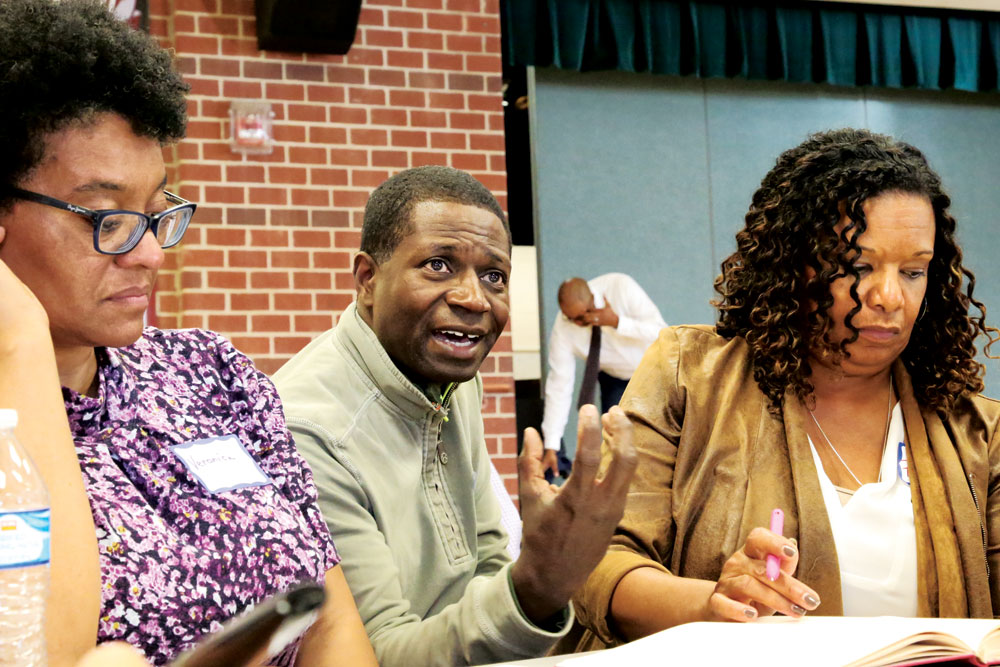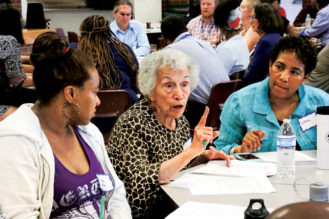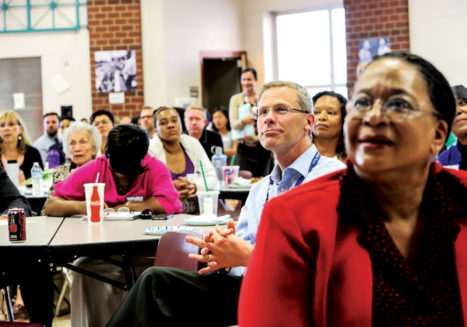
Community member Albert Koger discusses priorities in the task force recommendations, as Veronica Ware (left) and Franita Ware (right, unrelated) listen.
“I stand here as a representative of what a strong black community can produce, what education can and will produce when students that look just like me are presented with the opportunity.”
–William Anderson, Manual teacher, doctoral student
William Anderson’s statement above was greeted with enthusiastic applause from the diverse audience that gathered at a May meeting to hear recommendations by the African-American Equity Task Force (AAETF). These recommendations are aimed at helping Denver Public Schools (DPS) address opportunity and achievement gaps for black students and educators.

“I stand here as a representative of what a strong black community can produce, what education can and will produce when students that look just like me are presented with the opportunity.”
William Anderson,
Manual teacher, doctoral student
Anderson, a Manual High School teacher, teacher-leader, master’s degree holder, national policy board member and doctoral student, praised the task force’s work and highlighted its importance.
The Bailey Report
The AAETF arose in response to issues raised in a report critical of race relations within DPS. After black teachers voiced concerns about inequity, DPS asked Dr. Sharon Bailey, a former DPS board member, to research more deeply. Her August 2016 report emerged from one-on-one interviews and focus groups with African-American educators.
According to the Bailey report, DPS black educators are concerned about a lack of culturally competent, diverse teachers and African-American role models. They also feel that black students experience disproportionate discipline in a setting where most teachers are white females and that black students’ needs are overshadowed by those of ELL students.
Institutional racism was identified as a crucial component of the problems. In a school district that is 13 percent black, African-American educators comprise only 4 percent of teachers and are dispersed throughout the system, leading to feelings of isolation. Many teachers pointed to issues with human resources, including unfair evaluations and unclear and inconsistent practices.
Respondents also identified the recruitment and retention of African-American teachers as key components in diversifying the workforce and engaging African-American students. Studies show that having a black teacher can significantly improve black student performance in schools. Currently, despite significant recent growth, black students still lag behind their white peers in state test results and graduation rates.
Task Force Recommendations
In response to Dr. Bailey’s report, DPS commissioned the task force, which included over 150 DPS teachers, staff, parents and community members. Over seven months, working groups dove into six areas of concern: access, community and family engagement, discipline, instructional practice, human capital and the whole child.

Local education icon Anna Jo Haynes, president emeritus of Mile High Early Learning Centers, participated in the roundtable discussion of task force recommendations.
“What we learned: this work cannot be done to people. It has to be done with people,” stated Allen Smith, associate chief of DPS’s Culture, Equity and Leadership team. “The community is important in this process … because we know that this work is not going to be easy. We know that it’s not going to be overnight. And we know that we are going to need voices that are empowered to make hard decisions.”
The overarching recommendation that emerged is the creation of an African-American Equity Team to ensure that equity goals are being met by the district. In addition, 10 other recommendations, grouped into five categories, were presented at the community meeting in May. In turn, attendees discussed what they felt should be the highest priorities among those recommendations going forward.
University of Denver professor Ellen Miller-Brown, whose work focuses on intercultural development, has reviewed the Bailey report and the AAETF work. “Kudos to DPS for taking this on. I’m just really impressed. Not many districts would do this,” says Miller-Brown. She praises DPS for acknowledging the unique needs of the community that the system must address. “This can be done. It’s admirable the work they’ve done so far. The question is how are we collectively going to commit to this?”
Priorities Recommended to School Board
“We are now working closely with task force leaders on the prioritization of those recommendations,” says DPS Superintendent Tom Boasberg, who presented a report on the recommendations to the school board in June.
District 4 school board representative Rachele Espiritu believes the first priority is accountability, in the form of an oversight committee/equity team. Espiritu says four additional recommendations are being considered for initial implementation: developing school-site equity plans, providing culturally responsive education and training, creating a human resources task force, and opening a Center for Family Opportunity (CFO) in the far northeast to serve the African-American community.

Dr. Sharon Bailey (foreground), who wrote the report that identified the issues, listens at the May 24 community meeting as Superintendent Tom Boasberg (background) and attendees look on.
Espiritu is particularly excited to get to work on the CFO, which takes a two-generation approach. It provides wraparound services like financial literacy and workforce development to parents. “When families are supported, we see better outcomes for their children at school.”
In August, DPS will present plans to the school board for implementing the recommendations. Boasberg says part of the work until that time will involve determining which priorities will have a financial impact, how much they will cost, and what DPS will need to reduce or eliminate in other parts of its budget to support new programs.
The implementation promises to have far-reaching effects, says Boasberg. “The task force focused on improving opportunities for our African-American kids, but certainly a number of the recommendations apply not just to African-American kids but … to all kids of color in the Denver Public Schools or all kids.”




0 Comments